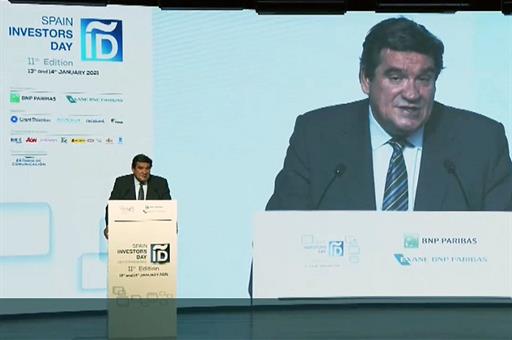Spain Investors Day
"Minimum Living Income creates a more cohesive and inclusive society, making Spain a more attractive country to invest in", says José Luis Escrivá
News - 2021.1.13
In this regard, he indicated that "the main aim of his ministerial department is to generate cohesion and certainty for economic agents and for Spanish society". To achieve this goal, he stated, "I presented Parliament a year ago with a plan based on three consensuses: one on pensions, another on inclusion and another on migration, and I can now say that the first two have been materialised and that I hope to address the third shortly".
In the case of pensions, explained José Luis Escrivá, following majority backing from the Lower House of Parliament for the recommendations of the Toledo Pact, a pension reform is now being undertaken, "with the aim of guaranteeing the long-term sustainability of the system under the principles of intergenerational solidarity and fiscal responsibility". In this regard, he underlined that "we have a good starting position thanks to the 2011 reform", and "we are working on several measures based on this to bring the actual retirement age more in line with the legal retirement age". He also added that "there is room to take measures both on early retirement and on incentives to delay retirement".
On the matter of inclusion, José Luis Escrivá underlined the approval of the Minimum Living Income in Parliament without a single vote against. This benefit, which he defined as an "innovative policy that can activate and enhance the possibilities of joining the labour market and recruitment of a significant number of Spanish workers, while making the Spanish economy more dynamic", currently benefits almost half a million people.
The minister also reviewed the protection measures taken due to the COVID-19 pandemic, indicating that, at the worst time, "they protected almost a quarter of all workers". "Our measures, he remarked, have been particularly well-designed to foster the activation of workers suspended as soon as conditions so allow". He also underlined that, unlike what happened in previous crises, "these measures have ensured that the fall in activity does not automatically turn into even more jobs being shed", thus avoiding this mass increase in unemployment "at a relatively limited fiscal cost".
These agreements to protect the income of workers and companies, remarked José Luis Escrivá, "are about to be renewed over the next few months", and have meant that we now have more workers on permanent employment contracts and more independent contractors than before the start of the pandemic.
With a view to the future, the minister stated that "our greatest challenge is to learn from these experiences", and use them to transform our job market, correcting our structural weaknesses (job insecurity, temporary contracts, etc.). Accordingly, "this successful experience of our model of Temporary Lay-off Plans (Spanish acronym: ERTEs) has taught us that there are efficient ways to make our job market more flexible and fairer", and hence "we must adapt this model to turn it into a structural element of our job market".
José Luis Escrivá expressed his conviction that, by combining efficient public investment and reforms, "the Recovery, Transformation and Resilience Plan of the Spanish economy is a great opportunity to enhance short-term economic growth and make the Spanish economy more productive, inclusive and resilient in the medium term".
Non official translation





